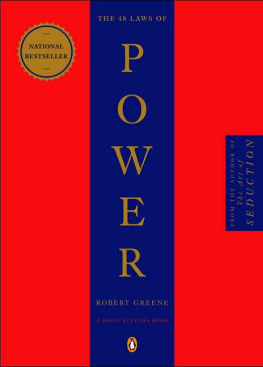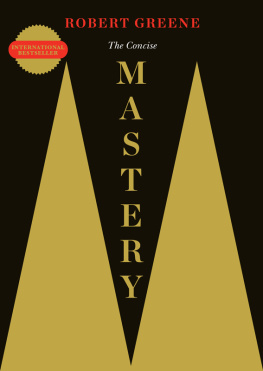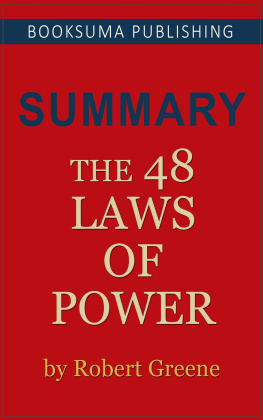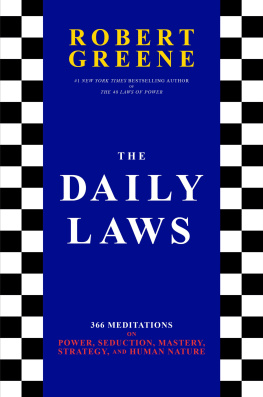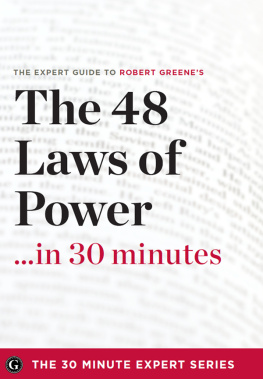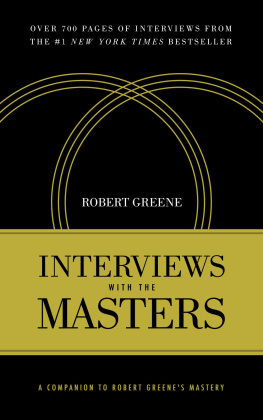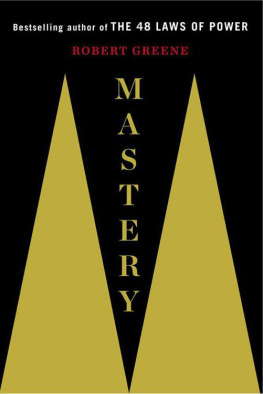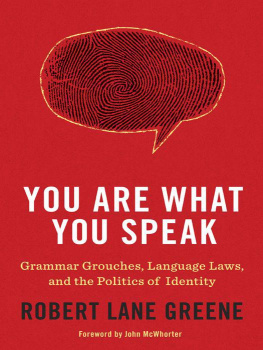THE
CONCISE LAWS
OF
HUMAN NATURE
ALSO BY ROBERT GREENE
Mastery
The 50th Law (with 50 Cent)
The 33 Strategies of War (A Joost Elfers Production)
The Art of Seduction (A Joost Elfers Production)
The 48 Laws of Power (A Joost Elfers Production)
THE
CONCISE LAWS
OF
HUMAN NATURE
ROBERT GREENE

This concise edition published in Great Britain in 2020 by
PROFILE BOOKS LTD
29 Cloth Fair
London EC1A 7JQ
www.profilebooks.com
Derived from The Laws of Human Nature, which was first published in Great Britain in 2018 by Profile Books and in the United States of America in 2018 by Viking, a division of Penguin Random House LLC
Copyright Robert Greene, 2018, 2020
The moral right of the author has been asserted.
All rights reserved. Without limiting the rights under copyright reserved above, no part of this publication may be reproduced, stored or introduced into a retrieval system, or transmitted, in any form or by any means (electronic, mechanical, photocopying, recording or otherwise), without the prior written permission of both the copyright owner and the publisher of this book.
A CIP catalogue record for this book is available from the British Library.
ISBN 9781788161565
eISBN 9781782834939
Contents
Introduction

If you come across any special trait of meanness or stupidity you must be careful not to let it annoy or distress you, but to look upon it merely as an addition to your knowledgea new fact to be considered in studying the character of humanity. Your attitude towards it will be that of the mineralogist who stumbles upon a very characteristic specimen of a mineral.
Arthur Schopenhauer
Throughout the course of our lives, we inevitably have to deal with a variety of individuals who stir up trouble and make our lives difficult and unpleasant. Some of these individuals are leaders or bosses, some are colleagues, and some are friends. They can be aggressive or passive-aggressive, but they are generally masters at playing on our emotions. They often appear charming and refreshingly confident, brimming with ideas and enthusiasm, and we fall under their spell. Only when it is too late do we discover that their confidence is irrational and their ideals ill-conceived. Among colleagues, they can be those who sabotage our work or careers out of secret envy, excited to bring us down. Or they could be colleagues or hires who reveal, to our dismay, that they are completely out for themselves, using us as stepping stones.
What inevitably happens in these situations is that we are caught off guard, not expecting such behavior. Often these types will hit us with elaborate cover stories to justify their actions, or blame handy scapegoats. They know how to confuse us and draw us into a drama they control. We might protest or become angry, but in the end we feel rather helplessthe damage is done. Then another such type enters our life, and the same story repeats itself.
We often notice a similar sensation of confusion and helplessness when it comes to ourselves and our own behavior. For instance, we suddenly say something that offends our boss or colleague or friendwe are not quite sure where it came from, but we are frustrated to find that some anger and tension from within has leaked out in a way that we regret. Or perhaps we enthusiastically throw our weight into some project or scheme, only to realize it was quite foolish and a terrible waste of time. Or perhaps we fall in love with a person who is precisely the wrong type for us and we know it, but we cannot help ourselves. What has come over us, we wonder?
In these situations, we catch ourselves falling into self-destructive patterns of behavior that we cannot seem to control. It is as if we harbor a stranger within us, a little demon who operates independently of our willpower and pushes us into doing the wrong things. And this stranger within us is rather weird, or at least weirder than how we imagine ourselves.
What we can say about these two thingspeoples ugly actions and our own occasionally surprising behavioris that we usually have no clue as to what causes them. We might latch onto some simple explanations: That person is evil, a sociopath or Something came over me; I wasnt myself. But such pat descriptions do not lead to any understanding or prevent the same patterns from recurring. The truth is that we humans live on the surface, reacting emotionally to what people say and do. We form opinions of others and ourselves that are rather simplified. We settle for the easiest and most convenient story to tell ourselves.
What if, however, we could dive below the surface and see deep within, getting closer to the actual roots of what causes human behavior? What if we could understand why some people turn envious and try to sabotage our work, or why their misplaced confidence causes them to imagine themselves as god-like and infallible? What if we could truly fathom why people suddenly behave irrationally and reveal a much darker side to their character, or why they are always ready to provide a rationalization for their behavior, or why we continually turn to leaders who appeal to the worst in us? What if we could look deep inside and judge peoples character, avoiding the bad hires and personal relationships that cause us so much emotional damage?
If we really understood the roots of human behavior, it would be much harder for the more destructive types to continually get away with their actions. We would not be so easily charmed and misled. We would be able to anticipate their nasty and manipulative maneuvers and see through their cover stories. We would not allow ourselves to get dragged into their dramas, knowing in advance that our interest is what they depend on for their control. We would finally rob them of their power through our ability to look into the depths of their character.
Similarly, with ourselves, what if we could look within and see the source of our more troubling emotions and why they drive our behavior, often against our own wishes? What if we could understand why we are so compelled to desire what other people have, or to identify so strongly with a group that we feel contempt for those who are on the outside? What if we could find out what causes us to lie about who we are, or to inadvertently push people away?
Being able to understand more clearly that stranger within us would help us to realize that it is not a stranger at all but very much a part of ourselves, and that we are far more mysterious, complex, and interesting than we had imagined. And with that awareness we would be able to break the negative patterns in our lives, stop making excuses for ourselves, and gain better control of what we do and what happens to us.
Having such clarity about ourselves and others could change the course of our lives in so many ways, but first we must clear up a common misconception: we tend to think of our behavior as largely conscious and willed. To imagine that we are not always in control of what we do is a frightening thought, but in fact it is the reality. We are subject to forces from deep within us that drive our behavior and that operate below the level of our awareness. We see the resultsour thoughts, moods, and actionsbut have little conscious access to what actually moves our emotions and compels us to behave in certain ways.
Let us call the collection of these forces that push and pull at us from deep within
Next page





